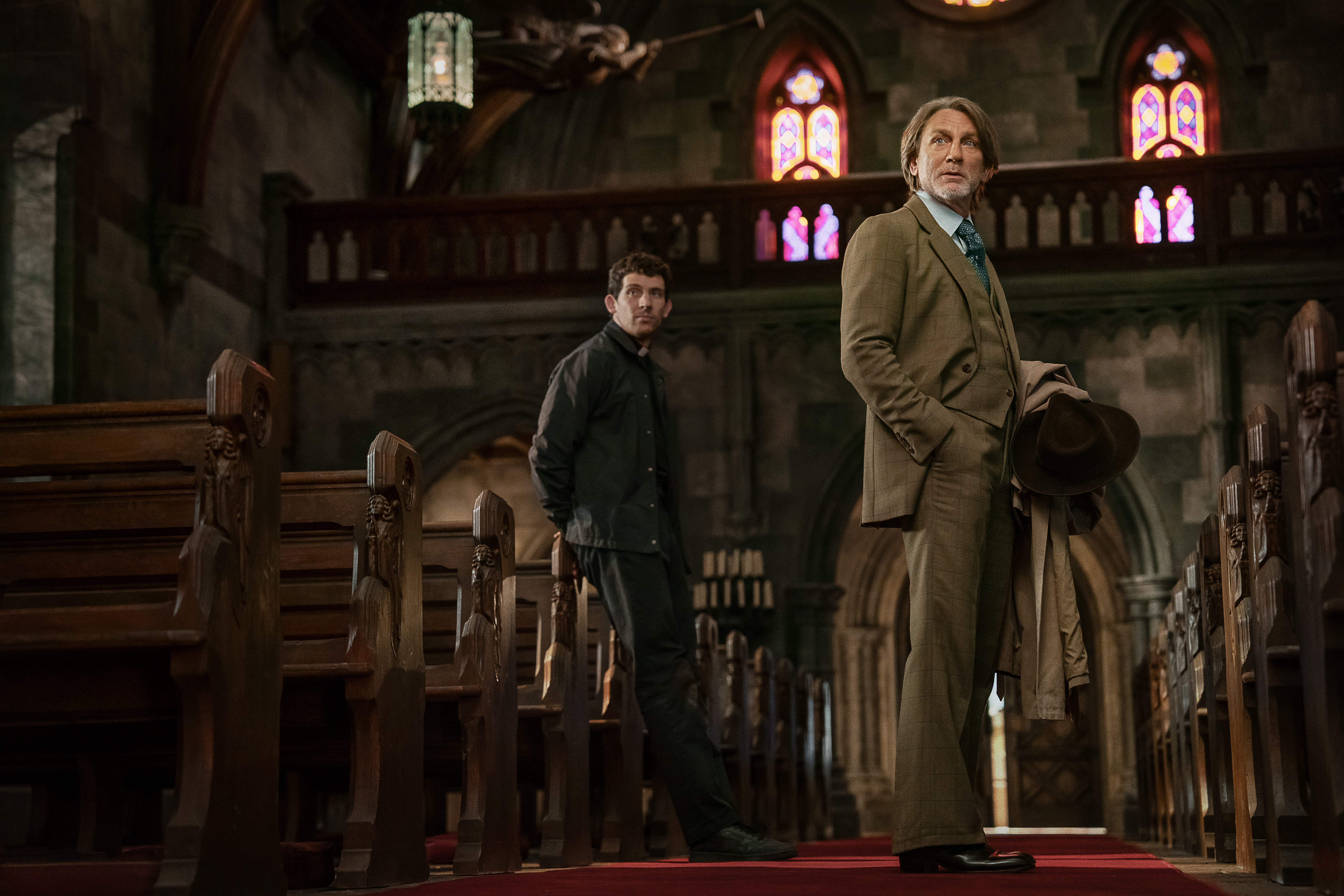For his feature directing debut, Aziz Ansari merges two familiar comedy devices: the body swap and the guardian angel intervention. In Ansari’s “Good Fortune,” an entry-level angel (Keanu Reeves) comes to the aid of a down-on-his-luck gig worker, Arj (Ansari), which involves Arj swapping lives with Jeff (Seth Rogen), a wealthy venture capitalist.
The jokes land: we witness Arj, an out-of-work documentary editor who wants to make his own films, hustle for TaskRabbit-type jobs. He botches a cinnamon bun shop errand and, in a hilarious early scene, crushes a child’s dream of becoming an archaeologist with a fatalistic speech about adulthood. Ansari, Rogen, and Reeves make for a delightful trio of heavy-hitters. Reeves’ Gabriel nails quips like, “I was a celestial being and now I’m a chain smoker addicted to nicotine.”
And the ensemble cast is pitch perfect: Sandra Oh shines as the lead angel, and though Stephen McKinley Henderson, as the most inspiring angel Azreal, only appears in one scene, together they give the angel-intervention concept heft. The script is trimmed and polished. At a post-screening Q&A following the film‘s premiere at the Toronto International Film Festival, Ansari and Reeves described working on the jokes at Ansari’s home through live readings and improvisation. Daniel Haworth’s edit is tight and assured — you’d never know production halted and restarted because of the writers’ strike. The Bel Air house, the pool, even the encampments of Los Angeles — all gleam.
But that high-gloss sheen works against the story, smoothing out the rough edges of gig work that make Arj’s reality less of a bummer.
The question is: less of a bummer for whom? Leaving the screening I asked myself: who are these jokes really for? They aren’t for the Arjs or the Elenas (Keke Palmer as a would-be union organizer and Arj’s love interest) of the world. They’re for the Jeffs — the people who can’t imagine ever becoming an Arj or an Elena.
The gig work humor and tech-bro satire appear to punch up at unfettered capitalism but actually punch down at the millions of workers whose problems won’t be solved by the end of the 98 minute running time. Ansari thinks it’s possible to make the behemoth issues of economic inequality and the housing crisis funny, citing inspirations like “Sullivan’s Travels” (1941) and “My Man Godfrey” (1936), both films about wealthy protagonists “slumming it” with the less fortunate. He thinks it’s possible because he is a Jeff.
There are nods to the power of community — Jeff and Gabriel discover it’s easier to survive the gig worker life together. And when Arj finally confesses to his father (played by Ansari’s real-life dad, Dr. Shoukath Ansari) that his “new apartment” is a lie, he receives the kindness he’s been longing for. But overall, “Good Fortune” is less about satirizing power than commodifying real struggles. I guess you don’t know what you don’t know.
In full disclosure, I am not a Jeff. Like Arj, I slept in my car in LA, parked in lots, and worried about security kicking me out. I’ve been a gig worker — Uber, Lyft, Instacart. I know too much to laugh uproariously like the Jeffs who filled the audience at the premiere. They laughed like people for whom this was all theoretical, another night of escapist entertainment. As Elena says to Arj-turned-Jeff in an earlier scene that cinematographer Adam Newport-Berra lights with moody green: “You’re in this house, telling me not to give up.”
Ultimately, we are left without a meaningful arc after the bodies switch back. Does Jeff’s speech to his Doordash-like board make a difference? Does Arj have a place to sleep that night? Raising systemic issues and then resolving them with humor falls flat for this critic. Yeah, the system sucks — but this is barely an insight, and it rings hollow to anyone who is not a Jeff.
The characters that resonated most weren’t the leads, but the workers on the margins. Felipe (Felipe Garcia Martinez), the dishwasher who befriends Gabriel at his first job, is unforgettable: despite working three jobs, he still makes time to go out dancing with his wife at the cumbia joint. That joy felt honest. So did the generosity of the Denny’s waiter who offers Arj a ride when he sees how hard a time he’s having. I wanted more of that, more of them.
So who is this movie really for? For someone who’s lived close to the edge, the film felt more hollow than empathetic. It spends most of its time showing us how bad things are for workers, then seems to say in its final scene that the solution is to make art about it. In the end, “Good Fortune” left me skeptical and uneasy, wondering whether the people it depicts with such lightheartedness will only feel objectified instead.
Grade: C+
“Good Fortune” premiered at the 2025 Toronto International Film Festival. Lionsgate will release the film in theaters on Friday, October 17.
Want to stay up to date on IndieWire’s film reviews and critical thoughts? Subscribe here to our newly launched newsletter, In Review by David Ehrlich, in which our Chief Film Critic and Head Reviews Editor rounds up the best new reviews and streaming picks along with some exclusive musings — all only available to subscribers.



